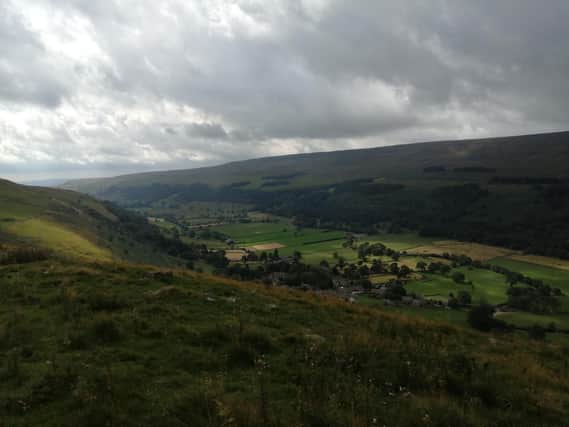North Yorkshire farmers take part in natural flood management trials for the new 'public money for public goods' Environment Land Management Scheme


A report published by the Yorkshire Integrated Catchment Solutions Programme (iCASP) describes how National Trust tenant farmers in Malham, Wharfedale, Wensleydale and Swaledale have been enlisted to develop natural flood management “outcome measures and monitoring approaches” which will feed into the new Environment Land Management Scheme (ELMS).
A key element of the ELMS which will be brought in by the new Agriculture Bill and replaces the former EU subsidy system, is slowing the flow in the uplands to prevent flooding downstream.
Advertisement
Hide AdAdvertisement
Hide AdHelen Keep, one of the report’s authors and senior farm conservation officer at the Yorkshire Dales National Park Authority, said: “Intense rainfall here often causes flooding of properties, as well as damage to the land such as the washing away of footpaths.
“The last time it happened was earlier this month when flood waters breached many homes and brought down walls and bridges in Wensleydale and Wharfedale. High rainfall here can also cause major flooding in urban areas such as York and Leeds.
“There can be little doubt that paying farmers and landowners to put in natural flood management measures will bring many positive public benefits. The question is how to create a workable payment scheme.”
The National Trust was already working in partnership with the Yorkshire Dales National Park Authority to run one of Defra’s Tests and Trial schemes focused on pollinators. This ‘Payment for Outcomes’ test was then extended to include natural flood management.
Advertisement
Hide AdAdvertisement
Hide AdThe scheme is one of two official ELMs tests and trials taking place in the national park, the other being a pilot scheme in Wensleydale.
The iCASP report details how the project focused on land parcels covering 10 sq km, tenanted by five farms across the Yorkshire Dales uplands. Using a mapping tool, iCASP identified areas of high risk for overland flow and/or soil erosion and that could benefit from natural flood management.
These findings were then verified by visits to the farms using the farmers’ local knowledge and ensuring the measure would work with their businesses.
Tom Akrigg, who farms at Cray in Upper Wharfedale, said: “It was interesting to be involved with iCASP.
Advertisement
Hide AdAdvertisement
Hide Ad“The exercise provided us with an insight into the principles of natural flood management in the uplands. The process allowed us to see how specific measures might be integrated within our existing farming systems in order to help slow the flow of water from the land whilst qualifying for the proposed ELMS scheme.”
Helen said: “Our approach has been to engage with National Trust tenant farmers to better understand opportunities and constraints of natural flood management interventions.
“One of the key findings is that farmers are receptive to natural flood management, however the main barrier to implementation is the impact on the farm business. A range of outcomes can be measured by monitoring and paid for accordingly.”
Support The Yorkshire Post and become a subscriber today. Your subscription will help us to continue to bring quality news to the people of Yorkshire. In return, you'll see fewer ads on site, get free access to our app and receive exclusive members-only offers. Click here to subscribe.
Link to use: https://www.yorkshirepost.co.uk/subscriptions